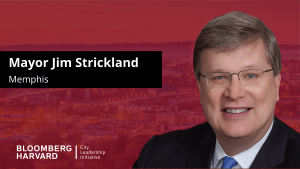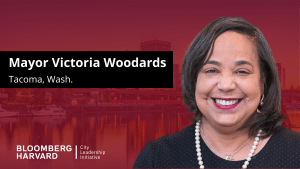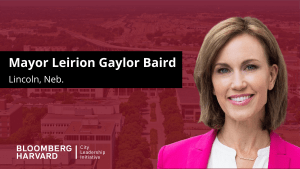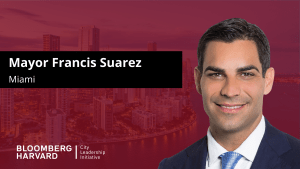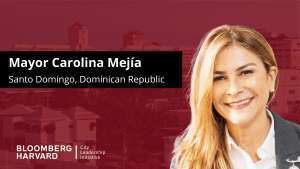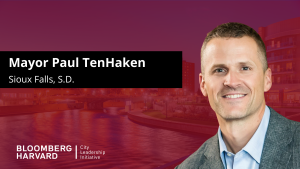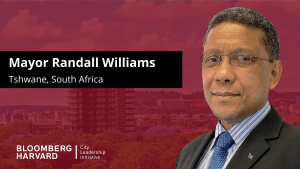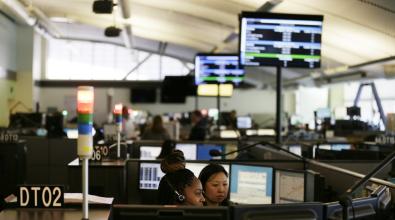How leadership training is shaping a generation of mayors
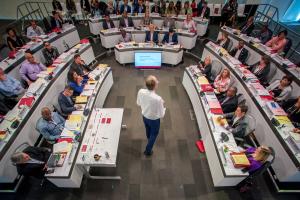
Mayors are busy people, as Amarillo, Texas, Mayor Ginger Nelson can attest. “As mayors, often our days are full of budget projections, crisis meetings, emails, media interviews—we’re spinning a lot of plates,” she says.
One commitment Mayor Nelson is grateful she made time for is her participation in the Bloomberg Harvard City Leadership Initiative. It’s a world-class executive training program for mayors and their top senior leaders, taught by faculty from the Harvard Kennedy School and Harvard Business School, and featuring urban leaders from Bloomberg Philanthropies’ global network of experts.
“This plate is worth spinning,” says Nelson, a member of the Bloomberg Harvard Class of 2022. “You're getting new tools and techniques from some of the best teachers in the world.”
This week, the initiative welcomes its sixth class of mayors, a diverse group of 40 leaders from North America, Latin America, Europe, and Africa. “This class brings together a diverse and dynamic group of mayors from across the globe,” says Michael R. Bloomberg, three-term mayor of New York City and founder of Bloomberg L.P. and Bloomberg Philanthropies. “With all the urgent shared challenges facing cities, the opportunity for mayors to exchange ideas and learn from one another and experts is more important than ever.”
The incoming class of mayors joins a network that includes nearly 200 of their peers from 24 countries who, through participation in the program, have built their leadership and management skills to do their jobs better. The initiative is the flagship program of the Bloomberg Center for Cities at Harvard University.
Participating mayors say the initiative is a gift that keeps on giving as they face new challenges in office day after day. Bloomberg Cities caught up with alumni to see how the program’s lessons continue to inform and elevate the work they and their staffs do each day.
Mayor Jim Strickland, Memphis, Tenn. (Class of 2018)
Strickland says a case study discussed during his time in the program about improving the performance of commuter trains in Japan led directly to successful efforts to reduce 911 response times in Memphis. “One of the things I learned from that case study was to talk and listen to the people who are actually doing the work,” Strickland says. “Because they may have great suggestions.” The mayor says ideas proposed by 911 dispatchers were critical to reducing average response times from about one minute to roughly eight seconds.
Strickland also says the program’s leadership lessons, as well as the continued outreach to past participants, was crucial when the COVID-19 pandemic unexpectedly began. “Be honest, be empathetic, be hopeful about the future,” Strickland recalls as key takeaways of crisis leadership trainings facilitated by the Bloomberg Harvard City Leadership Initiative during the peak of the pandemic. “I took notes at all of those sessions, and I would refer to those notes time and time again and tweak our messages to the public.”
Mayor Victoria Woodards, Tacoma, Wash. (Class of 2019)
Woodards was in her first year in office when she was invited to join the second Bloomberg Harvard class of mayors. She says her initial instinct was that she simply didn’t have the time. She’s relieved she reconsidered. “That would've been the worst mistake I could have made if I didn't do it,” she says.
For Woodards, the relationships forged in the program have been a source of strength throughout her mayoralty, particularly those with other Black mayors she met. “The African American mayors in the class started a text chain and we still use it to this day when we need information or when something good happens to somebody,” Woodards says. “The collective energy that we continue to keep with one another is a direct result of my Bloomberg Harvard experience.”
Mayor Leirion Gaylor Baird, Lincoln, Neb. (Class of 2020)
Gaylor Baird says one Bloomberg Harvard City Leadership Initiative session she attended made a “profound impression” on her. “Professor Mitchell Weiss spoke on the topic of innovation in the public sector—how we can experiment, learn, and adapt while being efficient with government resources,” she recalls. “He discussed the process of envisioning a desired goal, building a product, measuring results, learning from implementation, and then deciding whether to continue or pivot.”
Now in Lincoln, Gaylor Baird says, the city is testing the approach with a new initiative. The plan is to turn dead trees and other wood waste into biochar—a charcoal-like substance that sequesters carbon and is used in gardens to retain water and grow healthier plants. The idea for it came from Stockholm, whose mayor was in Gaylor Baird’s Bloomberg Harvard class. “Looking to other models allows us to test out something new in a manner that minimizes risk and maximizes efficiency, while advancing our local goals,” Gaylor Baird says.
Lincoln plans to build its first biochar production facility—the city was one of seven to recently receive up to $400,000 from Bloomberg Philanthropies for this purpose. “The opportunity to source successful, proven concepts through the Bloomberg network has been instrumental to the viability of our initiative,” Gaylor Baird says, “and we are grateful to be receiving financial support to allow us to realize our vision.”
Mayor Francis Suarez, Miami (Class of 2019)
Suarez says the Bloomberg Harvard City Leadership Initiative “has an intimate understanding of the challenges we face as mayors,” and has “helped equip class after class of mayors with the tools necessary to address those challenges.” A big takeaway for Suarez, who currently leads the U.S. Conference of Mayors, was the program’s emphasis on the ways mayors can partner and collaborate with each other. “As managers and executors, mayors can naturally feel alone when making decisions,” Suarez says. “But it’s important to remind yourself that there is a network of individuals that not only empathize with you, but they also want to help you.”
Mayor Carolina Mejía, Santo Domingo, Dominican Republic (Class of 2022)
Mejía calls her participation in the Bloomberg Harvard City Leadership Initiative “one of the most memorable experiences of my professional career,” and a “wonderful opportunity to interact with a fabulous group of people, both the professors and my peers, sharing experiences, analyses, strategies, and policy implementation techniques.”
A key lesson for her was the power of engaging residents deeply in problem solving. The program “definitely changed my way of understanding problems facing our constituents, by dissecting these problems through the lens of those people affected by them,” Mejía says. As part of the mayor's participation in the Bloomberg Harvard program’s innovation track, a team of city hall employees is now receiving training in how to use human-centered design to co-design waste management strategies with the residents of Santo Domingo’s crowded Los Guandules neighborhood. ”Policies and projects that take people’s opinion into account,” she says, “can endure over time.”
Mayor Paul TenHaken, Sioux Falls, S.D. (Class of 2019)
TenHaken participated in the Bloomberg Harvard City Leadership Initiative’s second cohort of mayors, who wrapped up the program not long before the pandemic. “Little did I know that we as mayors would be entering a year when our leadership would be tested like no other time during our collective terms,” he says. “From help with crafting public narratives to regularly scheduled touchpoints with Bloomberg Harvard leaders and mayors, the program was (and continues to be) instrumental in giving me the confidence and courage in dealing with the incredibly weighty challenges we have faced since 2020.”
Equally important, TenHaken says, has been the training his senior leadership team has accessed on topics such as effective negotiation and communication. That training “I have seen put into action as they lead their internal teams and our community as a whole,” TenHaken says. At the same time, the program has connected the mayor to colleagues all over the world. “The relationships built with civic leaders across the globe,” he says, “has created a confidential circle of colleagues that I know are not only experiencing the same challenges I am, but a circle I can jump into to help me solve problems and as I learn from other mayors and cities.”
Mayor Randall Williams, Tshwane, South Africa (Class of 2022)
Williams says when he started in the Bloomberg Harvard program, he was “a bit intimidated by the exceptional talent in the room.” He went on to develop critical relationships with many of the mayors and values being able to share challenges and solutions with them. “It was great to be able to connect and exchange views and ideas with mayors from across the world, both from developed and developing countries,” Williams says. “It was interesting to note that despite the fact that we come from different parts of the world, how similar the challenges and issues are that we have to deal with as mayors on a daily basis.”
Case studies and other learning resources are freely available to all through the Bloomberg Harvard City Leadership Initiative here.
